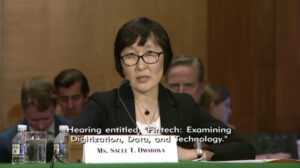This website uses cookies
We use cookies to ensure that we give you the best experience on our website. If you continue to use this site we will assume that you are happy with it.
Recent advances in computing power, data analytics, cryptography, and machine learning have made financial technology, or “fintech,” a hot topic in the financial sector, for both actors and regulators. On September 18, following a July report on the subject by the U.S. Treasury Department, the Senate Committee on Banking, Housing, and Urban Affairs held a hearing on fintech and its implications. Among the experts testifying before the committee was Professor Saule T. Omarova, co-director of the Jack Clarke Program on the Law and Regulation of Financial Institutions and Markets at Cornell.

Saule Omarova testifies before the Senate Banking Committee.
Speaking after representatives from Consumer Financial Data Rights, Fidelity Wealth Technologies, and the Mercatus Center at George Mason University, Omarova observed that it was symbolic to be holding the hearing almost exactly on the tenth anniversary of the failure of Lehman Brothers, which triggered a global financial crisis. “For many years before the crisis, you and your colleagues probably sat through many hearings just like this one, listening to many confident and articulate gentlemen with impeccable industry credentials tell you that you should not let outdated regulation stifle innovation,” she told the senators.
“Today, the same rhetoric of financial innovation and consumer choice that brought us the financial crisis of 2008 returns to center stage in the policy debate over fintech . . . Once again, new technologies promise to make the system more efficient, resilient, and democratic; to expand consumer choices; and to give low-income Americans access to financial services.”
She noted that the Treasury Department’s report translated this rhetoric into a strategy of significant deregulation geared toward enabling banks to form partnerships with data-mining companies. She asserted that, though such relationships may provide some conveniences to consumers, they also expose those consumers, as well as the economy at large, to tremendous risks.
Omarova argued that the Treasury Department’s recommendations could undermine a core principal of the U.S. banking system: the separation of banking and commerce. Allowing banks to engage intimately with commercial enterprises, she warned, creates the potential for excessive concentration of financial and market power, opening the door to “conglomerates that will control the flow of both money and information and effectively take control of our lives, not only as economic actors but also as citizens.”
“The American republic of George Washington and Thomas Jefferson was never meant to become a dystopian company town of this kind,” Omarova concluded. “As you deliberate on fintech as a public policy matter, I urge you to stand on guard and not let this become even a remote possibility.”
In addition to her in-person comments, Omarova provided a more detailed written testimony.